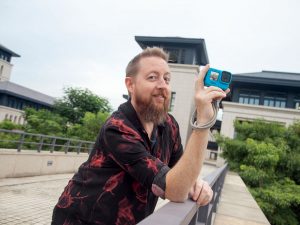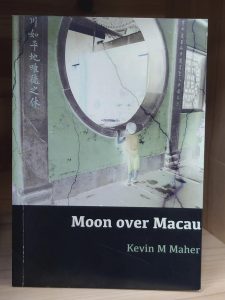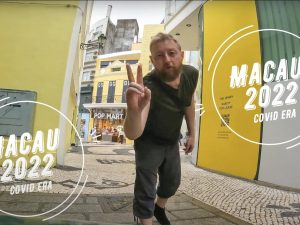Kevin Maher, senior instructor in the English Language Centre of the University of Macau (UM), is an urban explorer outside the classroom. He not only loves to traverse the hidden alleys of different cities, but also enjoys capturing his adventures on video. He has posted various videos on the internet to share his impressions of Macao with viewers from around the world. Inspired by Macao’s history and customs, he has also written a fictional story that takes place in the streets of the city.
Piecing Together an Urban Memory
Maher has travelled extensively. Born outside of Detroit, Michigan in the United States, he studied in both Europe and the US to earn two master’s degrees, one in Peace, Development, Security and International Conflict Transformation, and the other in Education-Teaching English as a Second Language. He also obtained a Certificate in English Language Teaching to Adults. In 1996, Maher left the US to embark on a life of adventure in Asia. He worked as an English teacher in South Korea and Japan. In 2013, Maher and his family moved to Macao and he became an instructor at UM, bringing a multicultural perspective developed from 17 years of experience teaching English in Asia.
Maher loves to explore the streets of Macao and some streets evoke specific feelings — the particular scenes, passers-by, buildings, sounds, and smells of these streets allow him to piece together his own urban memory, and to encounter something new during video shooting. ‘I particularly like the dead-end alleys in Macao because I enjoy walking to the end and then walking back along the same path. These alleys are usually very quiet without cars,’ says Maher. ‘On the way back, I always notice details that I’ve missed, so it is also a journey of rediscovery . Pátio da Ilusão (‘Patio of Illusion’ in English) in the São Lourenço neighbourhood is one of these dead-end alleys. Upon entering the patio, you get a feeling of being lost in time and can’t help but wonder about the Chinese black bricks and painted murals there.’
Maher has wandered around Macao countless times, looking for details to inform his memory of the city. He likes to choose a random bus from the university campus and allow the bus to lead the way, and he disembarks the bus as soon as he sees an appealing street scene. While filming, he likes to describe what he sees at the spot and candidly share his feelings. He has captured various scenes in his videos of Macao, including narrow streets, low tenement buildings, crisscrossing street shadows, construction sites, rubbish trucks driving by at slow speed, mossy walls, dusty iron windows, and the covered walkways on the UM campus.
Reminding Viewers of Their Past
Macao triggered Maher’s passion for videography and he has been making videos ever since. From documenting the coexistence of temples and churches in Macao to visiting the city’s old neighbourhoods, he has presented in his videos the unique cultural landscape of Macao as a place where the East meets the West.
Maher has recorded more than 3,800 videos, with over 3 million views and 21,400 subscribers on his channel. His viewers are from different countries and regions, such as the US, Portugal, the Philippines, mainland China, Hong Kong, and Macao. While shooting videos in Rua do Cunha in September this year, Maher was recognised by a couple from Europe who now live in mainland China. They say that Maher’s videos are very relatable. ‘I guess many viewers of my videos are people who are or have been living or working in Macao, or those who want to visit the city,’ says Maher. ‘On my channel, I often receive messages such as “I lived in Macao when I was a kid and it feels like a trip back in time; My grandfather grew up there too and he used to take me to …”. The images seem to have evoked their long-held memories of Macao.’
A Story lnspired by a Street Name
For Maher, adapting to life in a new city is a seamless process. Having lived in Macao for nearly ten years, he already sees the city as his second home. However, Maher’s son has autism, which made it difficult to adapt to life in Macao. Maher even wrote a short novel titled Moon Over Macau, a fictional piece that involves a character who is an autistic child.
The protagonist of the story is the owner of a Macao bar who always complains how his elderly father did not take good care of his autistic grandson. Before his death, the elderly father encounters the ghost of a drug addict who possesses an opium lamp from the late Qing dynasty and is inspired not to die with regrets, but to try to reconcile his relationship with his son. The book was published by the Association of Stories in Macao and Cerberus with the support of the Cultural Affairs Bureau and the Macao Foundation. It is now part of the UM Scholars Collection of the university library.
According to Maher, the idea of the drug addict’s ghost was inspired by Pátio da Ilusão. When Maher first arrived in Macao, he was immediately drawn to the stories behind the local streets and alleys. To write his novel, he researched information in many books about Macao, including his favourite Macao—People and Places, Past and Present by the historian Jason Wordie. ‘The book is filled with photos that illustrate the history of the streets and buildings of Macao. Based on these photos, I tried to locate the many bilingual street signs made of white porcelain tiles with blue lettering. The sign of Pátio da Ilusão is one of them,’ says Maher.
The name of the patio is appealing because it draws Maher to its past. ‘According to historical records, those who lived here in the past were drug addicts. The patio was named this way because the addicts were prone to hallucinations during the use of opium,’ he says. It was the street signs with local characteristics that inspired him to create a YouTube account named ‘Urban Canvas’ and use his camera to document Macao’s urban landscape.
Showing Students the Value of Learning
Maher currently teaches academic English writing and public speaking at UM. ‘The students in my class are usually very hardworking. Our classes are centered around academic writing and language practice. It’s more to actively be working with them in small groups as they improve their writing or speaking,’ says Maher. ‘My goal in teaching is simple: to help students master the academic expression of English, and my strategy is to show them the value of learning.’
Maher has a very busy teaching schedule so he usually spends his weekends with his children, but tries to devote a little time to videography. He considers sharing his experiences on his channel an interesting way to teach his students: ‘They can enhance their English listening skills, and some of them want to see how I introduce Macao to others.’
Source: My UM ISSUE 118




